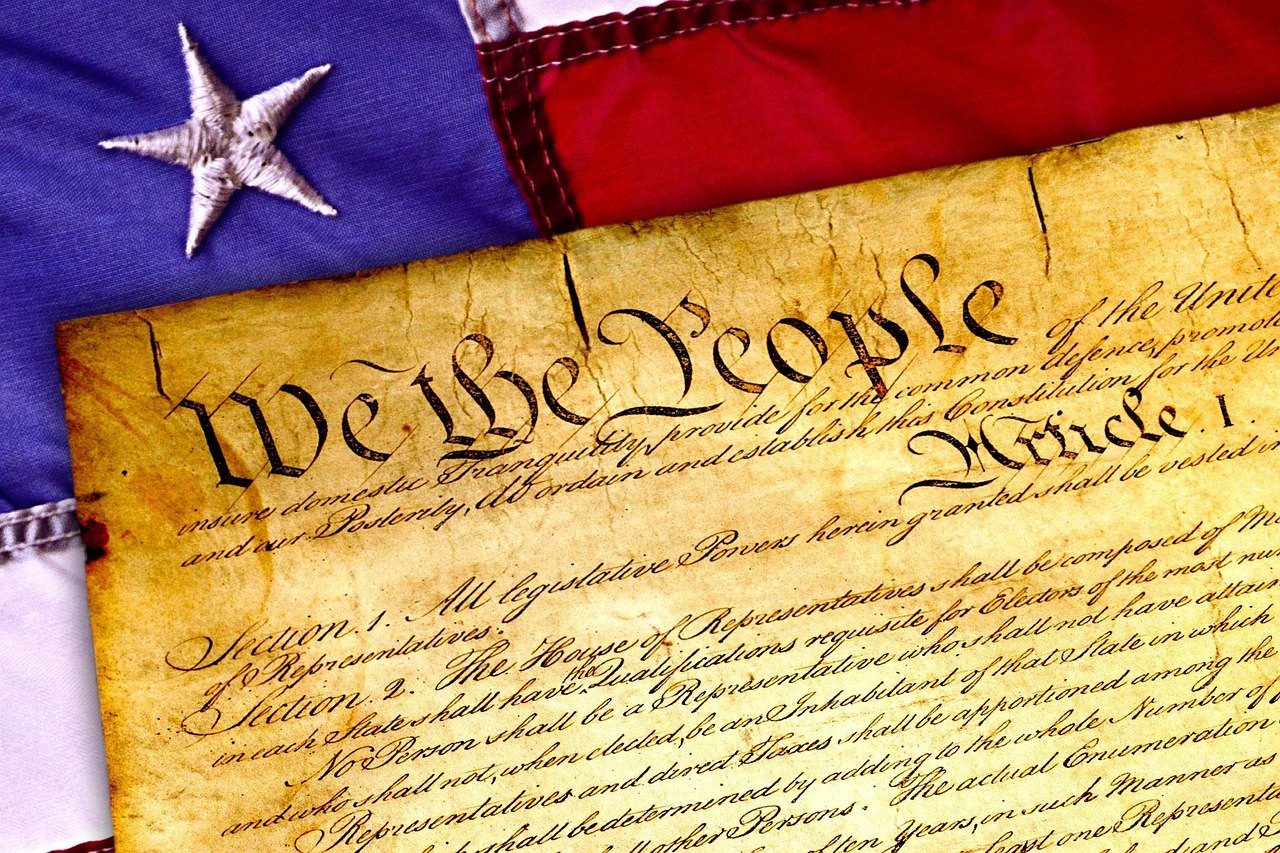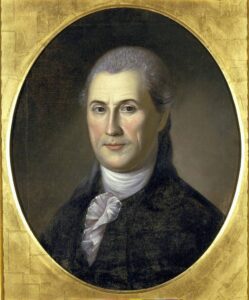
Samuel Huntington of Connecticut is another founding father that is not widely known; however, he had a long and interesting life of service. He was a lawyer, a jurist, a statesman, and most importantly a patriot. He signed the Declaration of Independence and the Articles of Confederation. He also served as president of the Continental Congress 1779-1781, President of the United States in Congress Assembled in 1781, and chief justice of the Connecticut Supreme Court 1784-1785. He was elected Governor of Connecticut in 1786 and served in that office until his death in 1796. He was the first American governor to die while in office.
Samuel Huntington was born on 16 July 1731 in Scotland Parish, Town of Windham, Connecticut (present day Scotland). He was the fourth of ten children and the second oldest son of Nathaniel Huntington and Mehetabel Thurston. Nathaniel’s family had arrived in New England in 1633. He was a farmer and clothier who built a home in Windham in 1732. The original house still stands and serves as a museum.
Nathaniel was active in the community and was one of the petitioners for permission to settle a minister in their part of town. He donated land for a meeting house and hosted the first meetings.
Eldest son, Nathaniel attended Yale College and became a minister in Ellington, Connecticut. Other brothers also attended college, but Samuel worked on the family farm and did not have a formal education except for the rudimentary academic training in the “common schools.” These schools mostly taught the basics of reading, writing and elementary mathematics geared to allow the young to be successful in the trades by preparing them for apprenticeships. Samuel was apprenticed to a cooper at the age of 16. He also had to continue working on the family farm.
Despite having little free time, Samuel wanted to learn so he borrowed books from the Reverend Ebenezer Devotion’s library and from local lawyers. His self-education eventually paid off and he was admitted to the bar in Windham in 1754. Samuel moved to Norwich, Connecticut to begin his legal practice.

Samuel apparently was interested in more than the library at Reverend Devotion’s because he married Martha Devotion on 17 April 1761. Martha was the daughter of the Reverend and his wife Martha Lothrop. The Devotion family had also settled in the colony early, having arrived in 1632.
Martha and Samuel had no children. Martha’s sister, Hannah, was married to Samuel’s brother, the Reverend Joseph Huntington. Hannah died in 1771, and Samuel and Martha adopted their two children. The son, Samuel H. Huntington became governor of Ohio in 1810 and the daughter, Frances, married the Reverend Edward D. Griffin, president of Williams College in Williamstown, Massachusetts.
In 1764, Samuel’s political career began with his election to be one of the Norwich representatives to the Connecticut Assembly. He distinguished himself and was re-elected every year for ten years.
Huntington was ambitious but not arrogant, skillful but not polished. He got things done diplomatically using persuasion and compromise, and he was respected by both freemen and the elite.
Royal Governor Jonathan Trumbull appointed Huntington King’s Attorney in 1765. He remained in that position until 1774 when Governor Trumbull appointed him to the Connecticut Superior Court. This position carried with it a seat on the Governor’s Council, which served as the upper house of the Connecticut Assembly. Samuel was named Chief Justice in 1778.
While his political career was developing, the troubles with the mother country were getting more intense, especially in Boston, Massachusetts. Huntington probably hoped compromise could be reached, but Britain’s use of taxes and force to control the colonies changed his beliefs. Although not a radical, Samuel Huntington became an advocate of separation from Britain. He publicly spoke out against the British taxes levied on the colonies, which put him with the majority of the Connecticut Assembly.
In October 1775, the Assembly elected Samuel to be one of the Connecticut delegates to the Second Continental Congress in Philadelphia, Pennsylvania. He traveled to Philadelphia with fellow delegate Oliver Wolcott in January 1776. It was a difficult two-week-long journey, arriving on 15 January. Samuel soon suffered with a bout of smallpox and could not attend Congress until February.
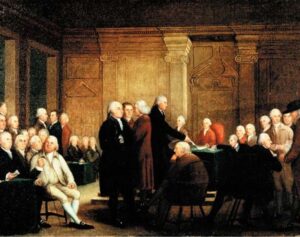
When the Richard Henry Lee resolution for independence was brought to the floor on 2 July 1776, Huntington voted for it. He then voted for the final draft of the Declaration of Independence on 4 July 1776, and signed the Declaration on 2 August 1776.
Samuel Huntington established a reputation for steady hard work and for a calm demeanor in tense situations. He was not known for learned or brilliant speech. He had a heavy load of committee assignments, so he spent long days in Congress. He disliked the city and received inadequate pay for his living expenses. He worried about and missed his family, and he worried about his business. He wanted to finish his work and return to his home and family as soon as possible.
It was November before Huntington returned to Norwich and he was immediately faced with the problems of the local war effort — rising prices, raising provisions, raising militia, and defending the coast. He was elected for the 1777 Congress but there was much to be done in Connecticut, so he declined. In July 1777, he and representatives from New England and New York met to discuss economic problems caused by the war.
Samuel returned to Congress in February 1778. Congress had adopted the Articles of Confederation. The Articles had many weaknesses, but Samuel recognized the need for some kind of unified government and strongly supported the document. After signing the final draft of the Articles, Huntington returned home; however, he was again elected to Congress. He returned to Philadelphia in May 1779.
The new session of Congress involved even more committee assignments for Samuel, including a committee to draft instructions for negotiating a peace treaty with Britain. He also concentrated on problems with military pay and a weak currency.
In September 1779, Huntington was preparing to return to Connecticut when he was elected President of the Continental Congress to replace John Jay who had been appointed minister to Spain. He was an excellent choice because he had considerable experience and did not have any regional biases. Pennsylvania delegate, Benjamin Rush described Huntington as: “a sensible, candid and worthy man, and wholly free from State prejudices.”
Samuel had been away from his wife since May, and it was apparent that he would need to stay in Philadelphia for the full year of his presidency, so he sent for Martha. She arrived in December and immediately suffered a bout of smallpox.
The Congressional presidency did not include extra pay, but Congress supplied a home, food, household supplies and staff. However, it was still a financial burden because he was expected to entertain members of Congress and foreign dignitaries. He received help in the form of additional funds from the Connecticut government, but it was not enough to cover his expenses. At the same time, his business interests and law practice in Connecticut continued to waste away.
Huntington presided over a very contentious Congress, which tested his diplomatic skills and patience. He was also faced with the need for copious amounts of official correspondence. Although he no longer served on committees, he was still an active Connecticut delegate. As president he dealt with absenteeism, bad mail service, and constant worry about the war and the fragile economy.
Samuel expected to return to Connecticut when his term as president expired in September 1780, but Congress voted to keep him for another year. The Articles of Confederation became the official constitution on 1 March 1781 when the last hold-out state, Maryland, ratified the document. The United States became an official nation, and Samuel Huntington became the first President of “The United States in Congress Assembled.”
By July 1781. Samuel was tired and probably in poor health, so he resigned and returned to Connecticut. Business matters had been neglected for too long, but his judgeship and seat on the Governor’s Council had been held for him. He arrived in Norwich on 25 July 1781.
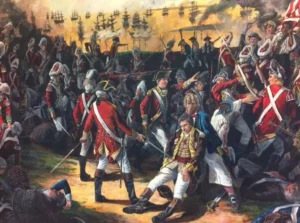
On 6 September, a British force of 1,700 men under the command of the traitor (and native of Norwich), Benedict Arnold, attacked New London and Groton. They burned both towns and attacked Fort Griswold. After a brave defense, the Fort Griswold commander surrendered the garrison. The British commander accepted the American commander’s sword and then killed him with it. The British troops then slaughtered many of the wounded and prisoners before burning the fort and withdrawing. The American losses were about 150 killed or wounded.
In the fall of 1781, Samuel resumed his seat in the state General Assembly and quickly became quite active in committee work. He served for two years. He drafted many documents including the first copyright law in America.
Huntington was re-elected to the United States Congress in May 1782, but declined to serve. Elected again in 1783, he chose to serve once more, and traveled to Princeton, New Jersey. Congress was meeting in Princeton to get away from “mutinous troops” who were demanding action on back pay and other benefits that Congress had promised them during the war. The “mutiny” ended soon, but Congress was slow to act on the troop’s legitimate demands.
Congress only met in Princeton for about four months and accomplished little during that time. The war had ended, although not officially, and Congress was faced with establishing a new and unique nation that had been at war for over eight years. Among the other subjects considered by the Congress were military pay, and the choice of a location for a national capital.
Samuel Huntington had previously served in Congress during some of the most difficult and discouraging years of the war. He must have felt considerable pride when in October 1783 word arrived that the Treaty of Paris was signed, and the long war was finally officially over. America was free.
Samuel Huntington left Congress for the last time in November 1783 and returned to Norwich. However, his service to the new nation was not over. He was elected Lieutenant Governor of Connecticut in 1784 and again in 1785. He also was working to rebuild his long-neglected law practice.
Elected Lieutenant Governor again in 1786, Samuel had taken the oath of office when fate intervened. No candidate for governor had won a majority of the popular vote so it was up to the General Assembly to select the governor. They selected Samuel Huntington.
Huntington faced a formidable challenge. Like most other states, Connecticut had suffered much social and economic upheaval during, and immediately after the war. He provided strong leadership, and the Assembly passed tax exemptions and other financial incentives to aid developing industries. The state also introduced procedures for handling claims by those injured during the Revolution.
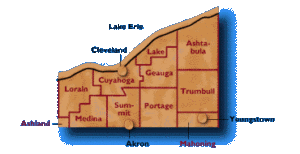
Under Connecticut’s 1662 Charter, they held claim to land west of the Appalachian Mountains. Connecticut and other states relinquished their western claims to the United States in 1786 in return for the US assuming their war debts. The US then established the “Northwest Territory” in 1787. Connecticut had retained the eastern part of its western lands south of Lake Erie, referred to as the “Western Reserve.” Under Huntington’s leadership, Connecticut sold this land to speculators in 1795 or 1796. The money received from this deal was used to compensate those who had lost “homes or other property” to British actions during the war. The rest of the money was used to establish a permanent school fund.
Samuel’s beloved wife, Martha Devotion Huntington, died at Norwich on 4 June 1794. She was buried in the Old Norwichtown Cemetery in Norwich. His brother, Joseph, died two years later. Following Martha’s death, Samuel’s health, which had been fragile most of his adult life, began to deteriorate.
As the economy improved and stabilized, Connecticut’s first banks were organized, the Connecticut Medical Society was incorporated, and support was given to struggling Yale College. Plans were made to construct a large State House in Hartford to accommodate the General Assembly, but it was not dedicated until after Huntington’s death in 1796.
Connecticut began considering ratification of the United States Constitution on 4 January 1788. The Connecticut delegation to Congress had been instrumental in the compromise (the Connecticut Compromise) that established the two-house legislative system we have today. Huntington was one of the speakers who strongly supported the Constitution, and on 9 January it was ratified by the state of Connecticut, the fifth state to do so.
Samuel Huntington had been governor of Connecticut for nearly ten years when he died on 5 January 1796. His health had been declining since the death of his wife Martha in 1794. Huntington died of “dropsy of the chest.”
Dropsy was an early term used to describe generalized swelling of the tissue caused by fluid retention (edema). The major underlying causes of dropsy are congestive heart failure, liver failure, kidney failure, and malnutrition. Because these were not clearly differentiated before the nineteenth century, a historical diagnosis of cause cannot be made. However, heart failure was the most frequent of the four.
Eighteenth century treatment of dropsy was very rudimentary and centered around the reduction of fluids. By far the most common method was bloodletting, but tubes inserted into body cavities were also used. These methods could not diagnose the underlying cause of dropsy, so the prognosis most often was death.
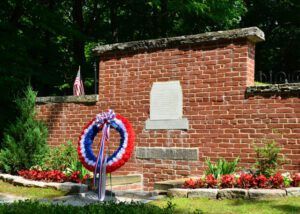
Samuel Huntington was buried in the Old Norwichtown Cemetery in Norwich. His and Martha’s grave monument is a marble slab in a brick wall. Newspaper accounts of Governor Huntington’s funeral report a procession of bands and dignitaries from his home to Norwich Church. His pastor and friend, Joseph Strong preached the funeral sermon. He described Huntington as “naturally amiable” with a “candid and deliberate manner.” He emphasized Huntington’s close family relationships.
No matter where his service had taken him, Huntington had longed to be home in Norwich with his beloved wife and their two adopted children. He was a faithful family man that also served his country any way that he could. His open-minded and diplomatic nature coupled with his intellect carried him to high office and gained him the respect and friendship of his peers.
At the time of his death, Samuel Huntington was well-known and respected in the nation he helped found and organize. He had been awarded honorary degrees by Princeton, Dartmouth, and Yale. He was friends with the giants of the founding of the United States including George Washington, Thomas Jefferson, and Benjamin Franklin.
Over time, Huntington’s fame waned and today few people have even heard of him, much less know of his accomplishments. To add insult to injury, Huntington, Connecticut, which was founded in 1789, was renamed Shelton in 1919. Pennsylvania and Indiana each have a town named after him and a public school in Norwich still bears his name. Not much of a legacy for a man that gave so much to his country. The signers of the Declaration of Independence should all be remembered and honored by all generations of Americans. Without them, we would still be British subjects, and without the USA much of the world, including Great Britain, would probably be speaking German or Japanese.
